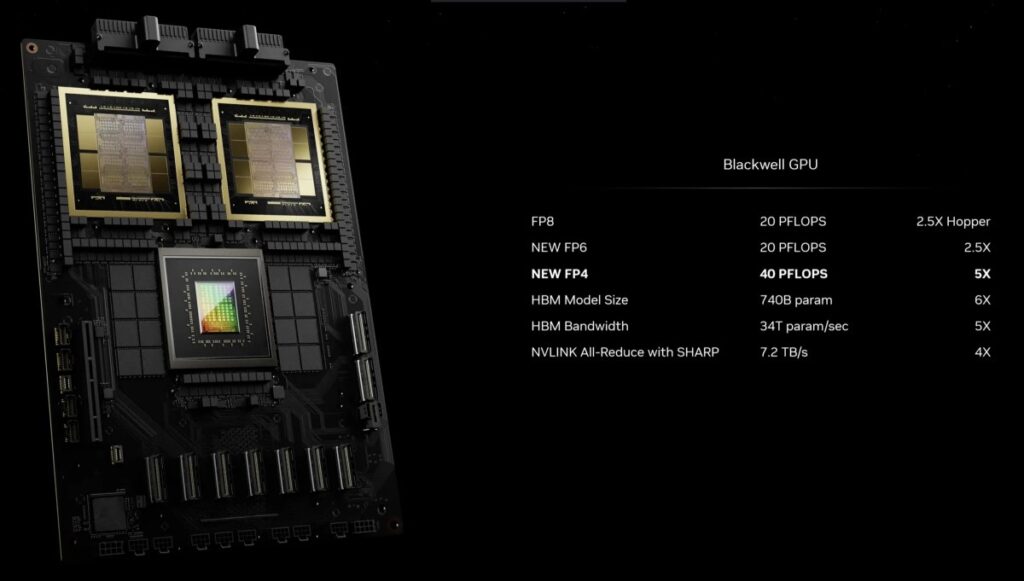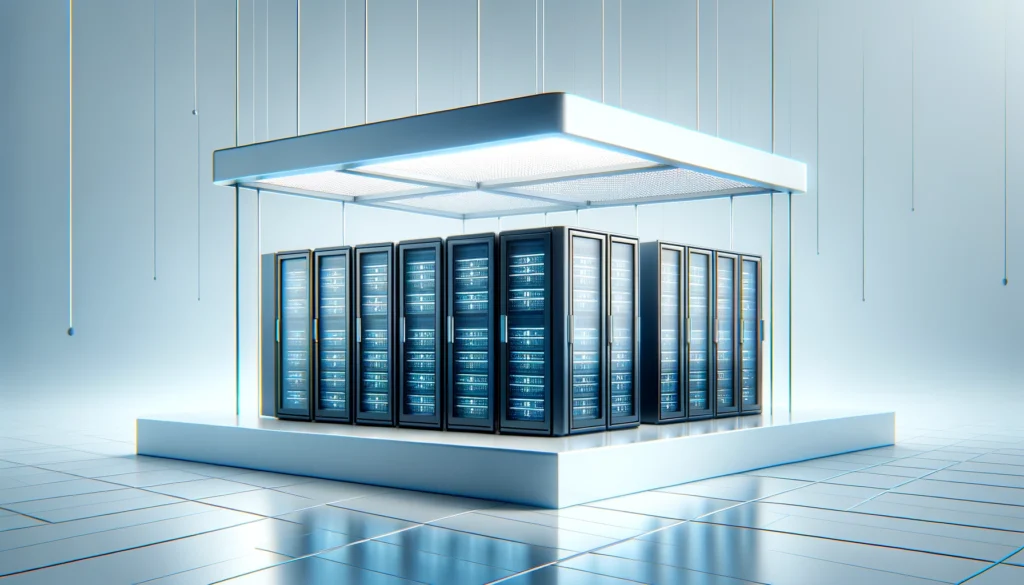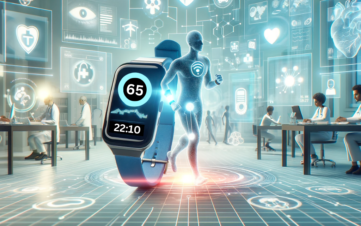NVIDIA, a well-known tech company, has made big news with its new Blackwell B200 GPU and the GB200 “super chip”. This is a huge step forward in the areas of Artificial Intelligence (AI) and other areas that need computational power. NVIDIA’s new chips will help make computers even more powerful, efficient, and scalable. The new Blackwell platform could change how IoT and AI technologies develop and work together. This blog post will look at NVIDIA’s new product and how it could change the future of IoT and AI, making them more efficient and capable than ever.
Overview of NVIDIA’s Blackwell Platform
At the heart of NVIDIA’s recent announcement is the Blackwell platform, which comprises the advanced B200 GPU and the GB200 super chip. The B200 GPU, boasting up to 20 petaflops of FP4 horsepower from its staggering 208 billion transistors, represents a monumental leap in processing power. The GB200 super chip, which combines two B200 GPUs with a single Grace CPU, offers an astounding 30 times the performance for LLM (Large Language Model) inference workloads compared to its predecessor, the H100, while purportedly slashing cost and energy consumption by up to 25 times.
NVIDIA’s CEO, Jensen Huang, presented these innovations during the GTC livestream, showcasing the substantial advancements the Blackwell platform brings to the table. The promise of significantly reduced cost and energy consumption, coupled with enhanced performance, positions the Blackwell platform as a cornerstone for the next generation of computing in IoT and AI domains.

Source: NVIDIA
Key to the Blackwell platform’s superiority is a suite of technological advancements, including a second-gen transformer engine that doubles compute, bandwidth, and model size capabilities by using four bits for each neuron instead of eight. Additionally, when linked in large arrays, the Blackwell GPUs leverage a next-gen NVLink switch, facilitating communication among up to 576 GPUs with 1.8 terabytes per second of bidirectional bandwidth. This immense processing network is underpinned by an entirely new network switch chip, incorporating 50 billion transistors and 3.6 teraflops of FP8 compute power, setting new benchmarks for interconnected GPU performance.
Implications for IoT Device Companies
NVIDIA’s unveiling of the Blackwell platform is more than just a milestone in computing technology; it’s a signal for new opportunities and challenges for IoT device companies. The combination of increased processing power and unmatched efficiency provides these companies with a strong foundation to innovate and scale their solutions like never before.
Blackwell’s platform allows IoT manufacturers to create smarter, autonomous devices with enhanced local processing, reducing latency and cloud reliance. This improves computational efficiency, enabling the spread of smart devices in areas like remote agricultural sensors, advanced health monitors, and autonomous logistics drones. Additionally, it addresses the challenges of sustainability and scalability, reducing energy consumption and operational costs. Using Blackwell’s technology, companies can improve device performance, contribute to a sustainable tech ecosystem, and align with global carbon reduction and energy efficiency efforts.
Advancing AI Capabilities in IoT
The intersection of AI and IoT, often referred to as AIoT, represents a frontier of innovation, with the potential to redefine how data is analyzed, interpreted, and acted upon in real time. NVIDIA’s Blackwell platform significantly propels this convergence forward, enabling IoT devices to leverage AI in ways that were previously unattainable due to computational and power limitations.
With the Blackwell platform, IoT devices can now incorporate advanced AI functionalities such as natural language processing, image recognition, and predictive analytics directly into their operations. This advancement not only enhances the user experience by providing more intuitive and responsive interactions but also opens up new possibilities for autonomous decision-making and action within devices, further blurring the lines between digital and physical worlds.
For instance, in industrial applications, machinery equipped with AI-powered sensors could predict maintenance needs, optimizing operations and preventing costly downtime. The advancement of AI capabilities in IoT, powered by NVIDIA’s Blackwell platform, underscores a significant shift towards more intelligent, autonomous systems that can learn, adapt, and respond to their environments in real time. For IoT device companies, this shift represents both a challenge and an opportunity to redefine the boundaries of what’s possible, driving innovation in a rapidly evolving digital landscape.
Reducing Energy Consumption and Operational Costs
The Blackwell platform’s energy-efficient design, boasting advanced processing capabilities with much lower power needs, sets a new benchmark for sustainable technology development. This is particularly beneficial for IoT devices, where energy consumption directly affects device lifespan and operation costs. Blackwell’s efficiency can prolong battery life, lessen maintenance frequency, and reduce the total cost of ownership, thereby making IoT solutions more accessible and feasible for widespread use. Operational costs, especially those related to data processing and storage, can be substantially cut with Blackwell’s integration. The platform’s capacity to process and analyze data on-device, or at the edge, reduces the need for constant data transmission to cloud-based servers, further decreasing operational costs and boosting data security.
Future Trends and Innovations
Looking ahead, the launch of NVIDIA’s Blackwell platform will spark many new trends and innovations in the AI fields. This platform doesn’t just solve current tech limits – it also creates new opportunities. Here are some trends and innovations we might see:
- AIoT Convergence: The blend of AI and IoT, or AIoT, will deepen, with more devices capable of intelligent decision-making and autonomous action. The enhanced processing power of Blackwell will enable more sophisticated AI models to be deployed directly on IoT devices, driving innovation in smart homes, cities, healthcare, and industrial automation.
- Edge AI Proliferation: With Blackwell’s efficiency and power, edge computing will see significant growth. AI processing at the edge reduces latency for real-time applications, such as autonomous vehicles and real-time health monitoring, setting the stage for a more responsive and intelligent network of devices.
- Sustainable Tech Solutions: As the tech industry faces increasing pressure to reduce its carbon footprint, Blackwell’s energy-efficient design will lead the way in developing sustainable technology solutions. This emphasis on sustainability is likely to become a core consideration in the design and deployment of future IoT and AI systems.
- Generative AI Expansion: With Blackwell’s enhanced performance for LLM inference workloads, generative AI applications, including content creation, drug discovery, and personalized AI tutors, will become more accessible and efficient, further blurring the lines between human and machine-generated content.
The NVIDIA Blackwell platform not only marks a significant advancement in the present but also lays the groundwork for a future where the potential of IoT and AI is boundless, characterized by innovation, efficiency, and deeper integration into the fabric of everyday life.
NVIDIA’s Blackwell platform represents a significant leap forward for the AI industry, offering unparalleled efficiency, processing power, and innovation potential. By addressing current limitations and setting new benchmarks for performance and sustainability, Blackwell paves the way for the next generation of intelligent, interconnected devices and systems.
For companies and developers willing to invest in the future, the Blackwell platform offers a foundation upon which to build transformative solutions that can reshape industries, enhance human experiences, and drive progress toward a more intelligent, efficient, and connected world.










